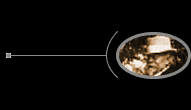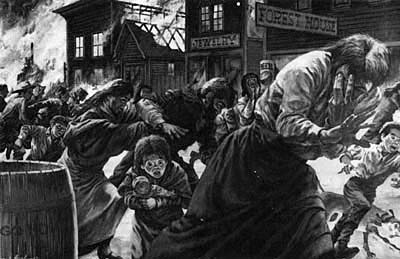


 |
  |
|
|
IT WAS NOW ABOUT half past eight in the evening. I first thought of my horse and turned him free into the street, deeming that, in any case, he would have more chance of escape thus than tied up in the stable. I then set about digging a trench six feet wide and six or seven feet deep, in the sandy soil of the garden, and though the earth was easy enough to work my task proved a tedious one. The atmosphere was heavy and oppressive, strangely affecting the strength and rendering respiration painful and laborious. The only consideration that could have induced me to keep on working when I found it almost impossible to move my limbs, was the fear, growing more strongly each moment into a certainty, that some great catastrophe was approaching. The crimson reflection in the western portion of the sky was rapidly increasing in size and in intensity; then between each stroke of my pickax I heard plainly, in the midst of the unnatural calm and silence reigning around, the strange and terrible noise already described, the muttered thunder of which became more distinct as it drew each moment nearer. This sound resembled the confused noise of a number of cars and locomotives approaching a railroad station, or the rumbling of thunder, with the difference that it never ceased, but deepened in intensity each moment more and more. The spectacle of this menacing crimson in the sky, the sound of this strange and unknown voice of nature constantly augmenting in terrible majesty, seemed to endow me with supernatural strength. Whilst toiling thus steadfastly at my task, the sound of human voices plainly audible amid the silence and species of stupor reigning around fell on my ear. They betrayed on the one hand thoughtlessness, on the other folly. A neighboring American family were entertaining some friends at tea. The room which they occupied at the moment overlooked my garden; thus they could see me whilst I could as easily overhear them. More than once, the smothered laughter of some of the guests, especially of the young girls, fell on my ear. Doubtless they were amusing themselves at my expense. About nine, the company dispersed, and Mrs. Tyler, the hostess, approached me. The actions of the priest always make a certain impression, even on Protestants. "Father," she questioned, "do you think there is any danger?" "I do not know," was my reply, "but I have unpleasant presentiments, and feel myself impelled to prepare for trouble." "But if a fire breaks out, Father, what are we to do?" "In that case, Madam, seek the river at once." I gave her no reason for advising such a course, perhaps I had really none to offer, beyond that it was my innate conviction. Shortly after, Mrs. Tyler and her family started in the direction of the river and were all saved. I learned later that out of the eight guests assembled at her house that evening, all perished with the exception of two. At a short distance from home, on the other side of the street, was a tavern. This place had been crowded all day with revellers, about two hundred young men having arrived that Sunday morning at Peshtigo by the boat to work on the railroad.5 Many were scattered throughout the town, where they had met acquaintances, while a large number were lodging at the tavern just mentioned. Perhaps they had passed the holy time of mass drinking and carousing there. Towards nightfall the greater part of them were too much intoxicated to take any share in the anxiety felt by the more steady members of the community, or even to notice the strange aspect of nature. Whilst working in my garden, I saw several of them hanging about the veranda of the tavern or lounging in the yard. Their intoxicated condition was plainly revealed by the manner in which they quarrelled, wrestled, rolled on the ground, filling the air the while with wild shouts and horrid blasphemies. When hastening through the street, on my way to the river at the moment the storm burst forth, the wind impelled me in the direction of this house. A deathlike silence now reigned within it, as if reason had been restored to the inmates, or fear had suddenly penetrated to their hearts. Without shout or word they re-entered the place, closing the doors as if to bar death out--a few minutes later the house was swept away. What became of them I know not. After finishing the digging of the trench I placed within it my trunks, books, church ornaments, and other valuables, covering the whole with sand to a depth of about a foot. Whilst still engaged at this, my servant, who had collected in a basket several precious objects in silver committed to my charge, such as crosses, medals, rosaries, etc., ran and deposited them on the steps of a neighboring store, scarcely conscious in her trouble of what she was doing. She hastily returned for a cage containing her canary, which the wind, however, almost immediately tore from her grasp--and breathless with haste and terror she called to me to leave the garden and fly. The wind, forerunner of the tempest, was increasing in violence, the redness in the sky deepening, and the roaring sound like thunder seemed almost upon us. It was now time to think of the Blessed Sacrament--object of all objects, precious, priceless, especially in the eyes of a priest. It had never been a moment absent from my thoughts, for of course I had intended from the first to bring it with me. Hastening then to the chamber containing the tabernacle, I proceeded to open the latter, but the key, owing to my haste, slipped from my fingers and fell. There was no time for farther delay, so I caught up the tabernacle with its contents and carried it out, placing it in my wagon as I knew it would be much easier to draw it thus than to bear it in my arms. My thought was that I should meet someone who would help me in the task. I re-entered to seek the chalice which had not been placed in the tabernacle, when a strange and startling phenomenon met my view. It was that of a cloud of sparks that blazed up here and there with a sharp detonating sound like that of powder exploding, and flew from room to room. I understood then that the air was saturated with some special gas, and I could not help thinking if this gas lighted up from mere contact with a breath of hot wind, what would it be when fire would come in actual contact with it. The circumstance, though menacing enough, inspired me with no fear, my safety seemed already assured. Outside the door, in a cage attached to the wall, was a jay that I had had in my possession for a long time. The instinct of birds in foreseeing a storm is well known, and my poor jay was fluttering wildly round his cage, beating against its bars as if seeking to escape, and uttering shrill notes of alarm. I grieved for its fate but could do nothing for it. The lamps were burning on the table, and I thought, as I turned away, how soon their gleam would be eclipsed in the vivid light of a terrible conflagration. I look on the peculiar, indeed almost childish frame of mind in which I then found myself, as most providential. It kept up my courage in the ordeal through which I was about to pass, veiling from me in great part its horror and danger. Any other mental condition, though perhaps more in keeping with my actual position would have paralyzed my strength and sealed my fate. I vainly called my dog who, disobeying the summons, concealed himself under my bed, only to meet death there later. Then I hastened out to open the gate so as to bring forth my wagon. Barely had I laid hand on it, when the wind heretofore violent rose suddenly to a hurricane, and quick as lightning opened the way for my egress from the yard by sweeping planks, gate, and fencing away into space. "The road is open," I thought, "we have only to start." |
||
 Fleeing toward the river |
||
|
I had delayed my departure too long. It would be impossible to describe the trouble I had to keep my feet, to breathe, to retain hold of the buggy which the wind strove to tear from my grasp, or to keep the tabernacle in its place. To reach the river, even unencumbered by any charge, was more than many succeeded in doing; several failed, perishing in the attempt. How I arrived at it is even to this day a mystery to myself. The air was no longer fit to breathe, full as it was of sand, dust, ashes, cinders, sparks, smoke, and fire. It was almost impossible to keep one's eyes unclosed, to distinguish the road, or to recognize people, though the way was crowded with pedestrians, as well as vehicles crossing and crashing against each other in the general flight. Some were hastening towards the river, others from it, whilst all were struggling alike in the grasp of the hurricane. A thousand discordant deafening noises rose on the air together. The neighing of horses, falling of chimneys, crashing of uprooted trees, roaring and whistling of the wind, crackling of fire as it ran with lightning-like rapidity from house to house--all sounds were there save that of the human voice. People seemed stricken dumb by terror. They jostled each other without exchanging look, word, or counsel. The silence--of the tomb reigned among the living; nature alone lifted up its voice and spoke. Though meeting crowded vehicles taking a direction quite opposite to that which I myself was following, it never even entered my mind that it would perhaps be better for me to follow them. Probably it was the same thing with them. We all hurried blindly on to our fate. Almost with the first steps taken in the street the wind overturned and dragged me with the wagon close to the tavern already mentioned. Farther on, I was again thrown down over some motionless object lying on the earth; it proved to be a woman and a little girl, both dead. I raised a head that fell back heavily as lead. With a long breath I rose to my feet, but only to be hurled down again. Farther on I met my horse whom I had set free in the street. Whether he recognized me--whether he was in that spot by chance, I cannot say, but whilst struggling anew to my feet, I felt his head leaning on my shoulder. He was trembling in every limb. I called him by name and motioned him to follow me, but he did not move. He was found partly consumed by fire in the same place. Arrived near the river, we saw that the houses adjacent to it were on fire, whilst the wind blew the flames and cinders directly into the water. The place was no longer safe. I resolved then to cross to the other side though the bridge was already on fire. The latter presented a scene of indescribable and awful confusion, each one thinking he could attain safety on the other side of the river. Those who lived in the east were hurrying towards the west, and those who dwelt in that west were wildly pushing on to the east so that the bridge was thoroughly encumbered with cattle, vehicles, women, children, and men, all pushing and crushing against each other so as to find an issue from it. Arrived amid the crowd on the other side, I resolved to descend the river, to a certain distance below the dam, where I knew the shore was lower and the water shallower, but this I found impossible. The sawmill on the same side, at the angle of the bridge, as well as the large store belonging to the Company standing opposite across the road, were both on fire. The flames from these two edifices met across the road, and none could traverse this fiery passage without meeting with instant death. I was thus obliged to ascend the river on the left bank, above the dam, where the water gradually attained a great depth. After placing a certain distance between myself and the bridge, the fall of which I momentarily expected, I pushed my wagon containing the tabernacle as far into the water as possible. It was all that I could do. Henceforth I had to look to the saving of my life. The whirlwind in its continual ascension had, so to speak, worked up the smoke, dust, and cinders, so that, at least, we could see clear before us. The banks of the river as far as the eye could reach were covered with people standing there, motionless as statues, some with eyes staring, upturned towards heaven, and tongues protruded. The greater number seemed to have no idea of taking any steps to procure their safety, imagining, as many afterwards acknowledged to me, that the end of the world had arrived and that there was nothing for them but silent submission to their fate. Without uttering a word--the efforts I had made in dragging my wagon with me in my flight had left me perfectly breathless, besides the violence of the storm entirely prevented anything like speech--I pushed the persons standing on each side of me into the water. One of these sprang back again with a half smothered cry, murmuring: "I am wet"; but immersion in water was better than immersion in fire. I caught him again and dragged him out with me into the river as far as possible. At the same moment I heard a splash of the water along the river's brink. All had followed my example. It was time; the air was no longer fit for inhalation, whilst the intensity of the heat was increasing. A few minutes more and no living thing could have resisted its fiery breath. |
||
5 The northern extension of the Chicago and Northwestern Railway from Fort Howard to Menominee and thence to Escanaba to connect with the iron mines in upper Michigan was under construction. In clearing the right-of-way, many fires had been allowed to escape into the woods. Tilton, Sketch of the Great Fires, 10; letter dated July, 1927, from John J. Casson of Los Angeles, a mechanic at the Peshtigo wooden-ware mill and a survivor of the fire, in Archives-Manuscripts Division, State Historical Society of Wisconsin.